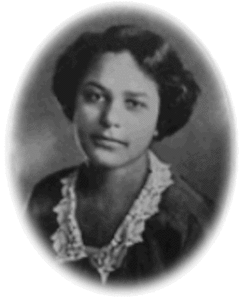
Clarissa Scott Delaney
This date celebrates the birth of Clarissa Scott Delaney in 1901. She was a Black educator, poet, and social worker.
She was born Clarissa M. Scott in Tuskegee, AL. Her father, Emmett J. Scott, was secretary to Booker T. Washington, founder of the Tuskegee Institute. After her early years in the South, she was sent to New England, where she was educated at Bradford Academy. She then attended Wellesley College, graduating from Phi Beta Kappa in 1923. She was an active college student. She was a member of Delta Sigma Theta, the debating team, and the Christian Association, and played varsity field hockey.
During her Wellesley years, she also attended meetings in Boston of the Literary Guild, where young Black people gathered weekly to listen to featured speakers, such as Claude McKay. This began her political and literary work in an environment that helped shape her ideas on art and literature. As a Black woman, she started her identification with the Harlem Renaissance. After college, Scott traveled through Europe.
When she returned, she moved to Washington, D.C., where she taught at Dunbar High School. She continued to write and publish in Opportunity. Like her colleagues among the Harlem writers, she wrote about Pan-Africanism, superstition, and the Mulatto, among other topics.
She won a prize for one of her poems, "Solace," published in Opportunity in 1925. That same year, she also wrote a play, "Dixie to Broadway," and the poem, "A Golden Afternoon in Germany.”
One year later, Scott married a young lawyer, Hubert T. Delaney, in Washington, D.C., and moved to New York City. She worked as a social worker in New York with the National Urban League and the Women’s City Club of New York. One project was to gather statistics for a "Study of Delinquent and Neglected Negro Children."
She died in 1927 of a kidney disease, which was probably a reaction to the streptococcal infection she had had for six months. According to a Wellesley classmate, her family established a "YWCA Camp Clarissa Scott" in 1931 on the Chesapeake Bay. Due to her tragically short life, she only published four poems.
The Poetry of the Negro, 1746-1970
Langston Hughes and Arna Bontemps
New York: Doubleday & Company, Inc. 1970